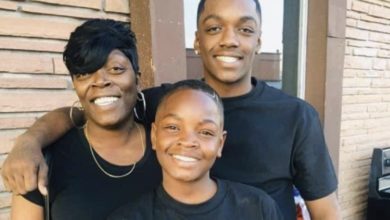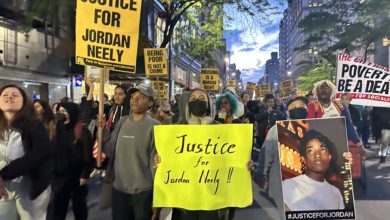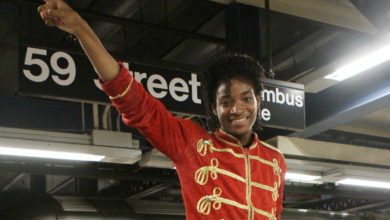The following is a talk given at a PSL community forum in Albuquerque, New Mexico to mark the ten year anniversary of Hurricane Katrina.
In the PSL we know that race and class are very intertwined. When we look at today’s capitalist system and analyze it from a class perspective this is obvious.
Ten years ago a horrible tragedy fell on the people of New Orleans and the Gulf Coast. About 1,800 people were killed in the aftermath of Hurricane Katrina. Since then the U.S. government and the Gulf Coast states have consistently violated the human rights of the hurricane victims. Public housing has been bulldozed, hospitals are slow to reopen and the criminal justice system is plagued with police brutality, as it is in the rest of the country.
Although all of these horrible things have affected the entirety of the New Orleans population both white and Black, we know that it is the African American community that suffers the most at the hands of this system.
We may say that this is because the government just doesn’t like Black people, just as Kanye West interjected during a live telethon type broadcast. While we know that there are government officials who truly “do not like Black people,” who are openly racist, there’s a lot more history and much more that comes along with this racism than the individual racism that we see on the surface.
The city of New Orleans has a long history of segregation and racial disparity. It goes without saying that all of this can be traced back to the origins of the slave trade and the genocide of Native peoples. After the end of chattel slavery, Black people along the Gulf Coast remained as virtual slaves as sharecroppers, and every attempt was made so that Black people could be prevented from getting an equal footing in society, both through racist vigilante violence by groups like the Klan, to formal laws that prevented Black people from getting ahead.
One of the most apparent ways in which the state institutionalized racism was in the 1890 formal “separate but equal” statutes written into Louisiana State law. The old Jim Crow laws relegated Black people to being second class citizens, keeping economic prosperity far out of reach. After World War 2, the economic prosperity that was felt throughout the country facilitated the draining of several swamps in New Orleans and prompted working-class whites to move into new suburbs that had been built by land developers. Segregation of course prevented Black people from moving into these new neighborhoods by the way of racist red lining by realtors, and the pressures of racist groups like the Klan, in conjunction with the local government and police.
After desegregation, public schools were required to take in more African American students. Many of these public schools were located in the newly founded and mostly white suburbs. This was unacceptable to the racists – the notion that Black children and white children would soon be socializing together within the school system horrified the racists. As a result, many racist white people fled the flood prone lowlands and took refuge in new suburbs like Algiers Point. The formerly all-white, flood-prone areas then became occupied by working-class Black folks and also small pockets of poor whites who stood with them or could not afford to leave.
It’s these neighborhoods that got hit the hardest when hurricane Katrina hit and it’s these neighborhoods that are today struggling with gentrification. So now that the levees are fixed, the public housing is bulldozed and all the Black people are out of the neighborhood, racists saw a way to reclaim their old neighborhoods, and developers saw prime ground to put up condos, lofts, and whatever other trendy housing that they can market to young mostly white professionals. We see this gentrification happening before our eyes in almost every city in the United States.
Many Black families who owned their homes, inherited from their grandparents and ancestors, have lost everything. These are families that through all hardships, slavery and then reconstruction, Jim Crow and racist vigilante violence, white supremacy and economic disenfranchisement, were still able to scratch a living out for themselves against all odds. To the capitalists, these families and their presence in the neighboorhood stood in the way of development and a future fortune. The devastation of Hurricane Katrina was useful to the developers in removing their obstacle. And they did it with the help of financial institutions, and the state. All was in line to finally claim what they wanted. A government that refused to allocate aid to the mostly poor and Black people, banks that would not give any loans and insurance companies that refused to acknowledge or even process the claims of the most devastated.
When Hurricane Katrina hit, I remember hearing the headlines about looters and lawlessness. Tell me, how can people scavenging through the ruins of their city trying to find anything that could help them survive be catogorized as “looters”? Even when people point out that there were people stealing consumer goods like TV’s, electronics etc., I think of a great comment to an internet article that I ran into while reading about Katrina.
“Who cares about all of the stuff in stores? It’s more valuable in the hands of someone who needs it than it will ever be on the shelf in a month. It’s such a waste of resources to try to secure some crappy manufactured goods when there are lives that can be saved. The value of man-made stuff cannot even be compared to the value of human life. The fact that people even waste precious time mentioning looting shows how petty the priorities of our culture are.”
And indeed these things are more valuable in the hands of those who need it. I can tell you right now that a large flat screen TV could get me a great deposit and first month of rent if I happened to lose everything I had to a disaster.
The news reports highlighted all of the supposed “looters” and gave special attention to rescuers from police departments and volunteers from other states coming in as being the heroes.
This is fine and all, but during the entire calamity never did we hear of the local neighborhood and Black heroes like former Marine John Keller who rescued a total of 244 people with a kayak, a hotwired boat, and an air mattress, or Malik Rahim, who helped rescue, rebuild, and fend off armed racist militias.
We never heard about the heroes from the LGBTQ community like Douglas Froeba and Tim Youngfill who sent some 400 personal medical supply kits to HIV patients.
We didn’t hear about Abdulrahman Zeitoun, a Muslim man who saved his family and over 10 people in his neighborhood using an old leaky canoe.
These are the heroes who the media never mentioned, and this is part of the tragedy, but there are also villains that the media didn’t mention.
Like the Danziger Bridge shooting where New Orleans Police Department officers killed two people and wounded four others. All of the victims were African American, none of them were armed with any sort of weapon and none of them had committed any crime. Five of those cops were found guilty of various charges including fabricating a cover up story as well as the shootings and the murders.
Never do we hear of the Algiers Point militia men – racist vigilantes who maimed and killed dozens of people under the guise of “protecting the community.” These racists were lauded by the NRA as heroes, and boasted of their crimes when asked of their shooting campaign by reporters. We never hear that it was local law enforcement along with the coroners office that refused to release information of the victims of their crimes. It was only after a lawsuit by a Nation magazine reporter that the information was released.
This is what we have to stand up against, an economic system that is protected by law enforcement, a judicial system and armed reactionary thugs.






